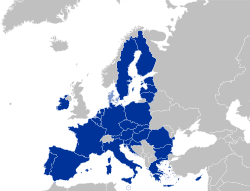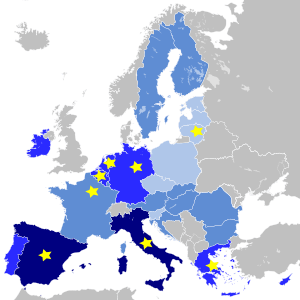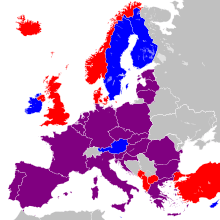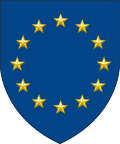Permanent Structured Cooperation
The Permanent Structured Cooperation (PESCO) is the part of the European Union's (EU) security and defence policy (CSDP) in which 25 of the 27 national armed forces pursue structural integration. Based on Article 42.6 and Protocol 10 of the Treaty on European Union, introduced by the Treaty of Lisbon in 2009, PESCO was first initiated in 2017.[1] The initial integration within the PESCO format is a number of projects which launched in 2018.[2]
 PESCO States Non-PESCO EU States | |
| Formation | 2018 |
|---|---|
| Type | Framework for structural integration within the Common Security and Defence Policy, based on Article 42.6 of the Treaty on European Union |
Membership | 25 member states' armed forces |
Together with the Coordinated Annual Review on Defence (CARD), the European Defence Fund and the Military Planning and Conduct Capability (MPCC) it forms a new comprehensive defence package for the EU.[1]
PESCO is similar to enhanced co-operation in other policy areas, in the sense that integration does not require that all EU member states participate.
History
Pre-activation
.jpg)
PESCO was first written into the European Constitution under Article III-312, which failed ratification, and then into the Treaty of Lisbon of 2009. It added the possibility for those members whose military capabilities fulfil higher criteria and which have made more binding commitments to one another in this area with a view to the most demanding missions shall establish permanent structured cooperation (PESCO) within the EU framework. PESCO was seen as the way to enable the common defence foreseen in Article 42, but the scepticism towards further integration that had arisen around the rejection of the European Constitution meant its activation was unlikely. It was termed, by President Jean-Claude Juncker, the Lisbon Treaty's "sleeping beauty".[3][4]
In the 2010s, the geopolitical landscape around the EU began to change, triggering a series of crises. The Libyan Civil War, the Syrian Civil War and the rise of the Islamic State of Iraq and the Levant caused the European migrant crisis. Russia intervened in Ukraine in 2014, annexing Crimea and triggering an ongoing conflict in the country over the Ukraine–European Union Association Agreement. In 2016, Donald Trump who was elected as President of the United States has been critical of NATO allies, even refusing on several occasions to back the mutual defence clause; and the United Kingdom, one of the EU's two largest military powers, voted in a referendum to withdraw from the EU.[4][5]
This new environment, while very different from the one PESCO was designed for, gave new impetus to European defence cooperation. The withdrawal of the UK, historically an opponent of that cooperation, gave further hope of success. At a rally in Bavaria, Angela Merkel argued that: “The times in which we could completely depend on others are, to a certain extent, over ... I’ve experienced that in the last few days. We Europeans truly have to take our fate into our own hands.” In late 2016, the EU put defence co-operation on its post-Brexit Bratislava and Rome declarations.[4][5]
There was some disagreement between France and Germany about the nature of PESCO. France foresaw a small but ambitious group with serious capabilities making major practical leaps forward; while Germany, weary of further divisions in the EU, wanted a more inclusive approach that could potentially include all states, regardless of their military capability or willingness to integrate. Further, for Germany, it was about building capabilities and giving a post-Brexit signal of unity, whereas France was focused on operations and looking for help for its overstretched African deployments. Their compromise was to re-imagine PESCO as a process. PESCO would be inclusive, but not all states had to take part in all projects and progress would be phased allowing the development of new, common capabilities without having to resolve larger differences on end-goals first. Further, states would not need to already have capabilities, but merely pledge to work towards them. This allowed France's idea of improving military capabilities without shutting out states who did not already attain the threshold.[6][7]
Activation
_(24517741968).jpg)
On 7 September 2017, an agreement was made between EU foreign affairs ministers to move forward with PESCO with 10 initial projects.[8][9][1][10] The agreement was signed on 13 November by 23 of the 28 member states. Ireland and Portugal notified the High Representative and the Council of the European Union of their desire to join PESCO on 7 December 2017[11] and PESCO was activated by the 25 states on 11 December 2017 with the approval of a Council Decision.[12][13] Denmark did not participate as it has an opt-out from the Common Security and Defence Policy, nor did the United Kingdom, which is scheduled to withdraw from the EU in 2020.[14][15] Malta opted-out as well.[16][17]
Principles
Those Member States whose military capabilities fulfil higher criteria and which have made more binding commitments to one another in this area with a view to the most demanding missions shall establish permanent structured cooperation within the Union framework. Such cooperation shall be governed by Article 46. It shall not affect the provisions of Article 43.
— Article 42.6 of Treaty on European Union
Those states shall notify their intention to the Council and to the High Representative. The Council then adopts, by qualified majority a decision establishing PESCO and determining the list of participating Member States. Any other member state that fulfills the criteria and wishes to participate can join the PESCO following the same procedure, but in the voting for the decision only the states already part of the PESCO will participate. If a participating state no longer fulfills the criteria a decision suspending its participation is taken by the same procedure as for accepting new participants, but excluding the concerned state from the voting procedure. If a participating state wishes to withdraw from PESCO it just notifies the Council to remove it from the list of participants. All other decisions and recommendations of the Council concerning PESCO issues unrelated to the list of participants require a unanimous vote of the participating states.[3]
The criteria established in the PESCO Protocol are the following:[3]
- co-operate and harmonise requirements and pool resources in the fields related to defence equipment acquisition, research, funding and utilisation, notably the programmes and initiatives of the European Defence Agency (e.g. Code of Conduct on Defence Procurement)
- capacity to supply, either at national level or as a component of multinational force groups, targeted combat units for the missions planned, structured at a tactical level as a battle group, with support elements including transport (airlift, sealift) and logistics, within a period of five to 30 days, in particular in response to requests from the United Nations, and which can be sustained for an initial period of 30 days and be extended up to at least 120 days.
- capable of carrying out in the above timeframes the tasks of joint disarmament operations, humanitarian and rescue tasks, military advice and assistance tasks, conflict prevention and peace-keeping tasks, tasks of combat forces in crisis management, including peace-making and post-conflict stabilisation[3]
Participating armed forces

The following member states have announced their intention of participating in PESCO:
|
These are the only non-participant EU member states:
- Denmark, which has a permanent opt-out from the common defence policy.
- Malta, which wants to see how PESCO develops first since it may violate the Maltese Constitution (Neutrality Clause).[18]
PESCO is being developed to allow participation of third-states in the future.[13] Norway is another country which this could apply to, as it is been active in past EU military operations.[19][20]
| Organisation for Joint Armament Cooperation | |||||
|---|---|---|---|---|---|
| Membership | Common Security and Defence Policy | ||||
| General participation |
Permanent Structured Cooperation | ||||
| No | No | No | 2009 | No | |
| 1995 | Founder | Founder | No | No | |
| Founder | Founder | Founder | Founder | 2003 | |
| 2007 | 2007 | Founder | 2004 | No | |
| No | No | No | Founder | No | |
| 2004 | 2007 | Founder | No | No | |
| 2013 | 2013 | Founder | 2009 | No | |
| 2004 | 2004 | Founder | 1999 | No | |
| 1973 | No | No | Founder | No | |
| 2004 | 2004 | Founder | 2004 | No | |
| 1995 | Founder | Founder | No | Partial | |
| Founder | Founder | Founder | Founder | Founder | |
| Founder | Founder | Founder | 1955 | Founder | |
| 1981 | Founder | Founder | 1952 | No | |
| 2004 | 2004 | Founder | 1999 | No | |
| No | No | No | Founder | No | |
| 1973 | Founder | Founder | No | No | |
| Founder | Founder | Founder | Founder | Founder | |
| 2004 | 2004 | Founder | 2004 | No | |
| 2004 | 2004 | Founder | 2004 | Partial | |
| Founder | Founder | Founder | Founder | Partial | |
| 2004 | 2004 | No | No | No | |
| No | No | No | 2017 | No | |
| Founder | Founder | Founder | Founder | Partial | |
| No | No | No | 2020 | No | |
| No | EDA partnership | No | Founder | No | |
| 2004 | 2004 | Founder | 1999 | Partial | |
| 1986 | Founder | Founder | Founder | No | |
| 2007 | 2007 | Founder | 2004 | No | |
| No | EDA partnership | No | No | No | |
| 2004 | 2004 | Founder | 2004 | No | |
| 2004 | 2004 | Founder | 2004 | No | |
| 1986 | Founder | Founder | 1982 | Founder | |
| 1995 | Founder | Founder | No | Partial | |
| No | EDA partnership | No | No | No | |
| No | No | No | 1952 | Partial | |
| No | EDA partnership | No | No | No | |
| No | No | No | Founder | Founder | |
| No | No | No | Founder | No | |
Neutral states
PESCO includes four of the five EU states that describe themselves as neutral (Austria, Finland, Ireland, and Sweden), and is designed to be as inclusive as possible by allowing states to opt in or out as their unique foreign policies allow. Some members of the Irish Parliament considered Ireland joining PESCO as an abandonment of neutrality. The measure was passed, with the government arguing that its opt-in nature allowed Ireland to "join elements of PESCO that were beneficial such as counter-terrorism, cyber security and peace keeping ... what we are not going to be doing is buying aircraft carriers and fighter jets."[21] While critics of Ireland's participation point to the commitment to increase defence spending, the government has made clear that the 2% commitment is collective, and not for each state individually. The Irish government has made clear that any defence spending increase by Ireland would be minor.[22] Malta, the only neutral state not to participate, argued that it was going to wait and see how PESCO develops, in order to see whether it would compromise Maltese neutrality.[18]
NATO

About four-fifths of PESCO members are also member states of NATO, and one EU state (Denmark) that is a member of NATO but not a member of PESCO.[23] While PESCO was formed in part due to doubts over US commitment to NATO,[3] officials stress that PESCO will be complementary to NATO security rather than in competition with it. NATO is still viewed as the main guarantor of Europe's defence, while PESCO focuses on crisis deployments. NATO Secretary General Jens Stoltenberg also highlighted how Military Mobility is a key example of NATO and EU co-operation.[24][25]
Governance
PESCO has a two-layer structure:
- Council Level: Responsible for the overall policy direction and decision-making including as regards the assessment mechanism to determine if Member States are fulfilling their commitments. Only PESCO members are voting, decisions are taken by unanimity (except decisions regarding the suspension of membership and entry of new members which are taken by qualified majority).
- Projects Level: Each project will be managed by those member states that contribute to it, in line with general rules for project management to be developed at overarching level.
Secretariat
The European Defence Agency and External Action Service will act as PESCO's secretariat.[26]
Funding
PESCO projects will be incentivised by the European Commission’s newly established European Defence Fund.
Projects
Planned
The first PESCO projects started with a list of 50 ideas and was whittled down to provide a short list of small-scale projects. Major armament projects are intended in the future (EU forces use 178 different weapon systems compared to 30 in the US), but initially PESCO is to be focused on smaller operations to lay groundwork.[7]
Seventeen projects were adopted in 2017, a further 17 in 2018 and another 13 in 2019[27]
| Project name | Abbr. | P | P+O | |||||||||||||||||||||||||
|---|---|---|---|---|---|---|---|---|---|---|---|---|---|---|---|---|---|---|---|---|---|---|---|---|---|---|---|---|
| European Medical Command | EMC | O | P | P | L | P | O | O | P | P | P | P | P | 9 | 12 | |||||||||||||
| European Secure Software-defined Radio | ESSOR | P | O | P | L | P | P | P | P | P | O | 8 | 10 | |||||||||||||||
| Network of logistic Hubs in Europe and support to Operations | N/A | P | P | P | P | O | L | P | P | P | P | P | P | P | P | 13 | 14 | |||||||||||
| Military Mobility | N/A | P | P | P | P | P | P | P | P | P | L | P | P | O | P | P | P | P | L | P | P | P | P | P | P | P | 24 | 25 |
| European Union Training Mission Competence Centre | EU TMCC | P | P | P | P | L | L | P | L | P | P | P | P | O | L | P | 14 | 15 | ||||||||||
| European Training Certification Centre for European Armies | ? | P | L | O | 2 | 4 | ||||||||||||||||||||||
| Energy Operational Function | EOF | P | O | L | O | O | P | O | O | P | 4 | 9 | ||||||||||||||||
| Deployable Military Disaster Relief Capability Package | ? | P | O | P | P | L | P | 5 | 8 | |||||||||||||||||||
| Maritime (Semi-) Autonomous Systems for Mine Countermeasures | MAS MCM | L | O | O | P | P | P | P | P | O | 6 | 10 | ||||||||||||||||
| Harbour & Maritime Surveillance and Protection | HARMSPRO | O | P | P | L | O | P | 4 | 6 | |||||||||||||||||||
| Upgrade of Maritime Surveillance ("integrate land-based surveillance systems, maritime and air platforms") |
P | P | P | L | P | P | O | P | 7 | 8 | ||||||||||||||||||
| Cyber Threats and Incident Response Information Sharing Platform | CTISP | P | O | P | O | O | O | L | P | P | O | P | O | P | 7 | 14 | ||||||||||||
| Cyber Rapid Response Teams and Mutual Assistance in Cyber Security | O | P | O | P | P | O | O | L | P | P | O | P | 7 | 12 | ||||||||||||||
| Strategic Command and Control (C2) System for CSDP Missions and Operations | P | P | O | P | L | 4 | 5 | |||||||||||||||||||||
| Armoured Infantry Fighting Vehicle / Amphibious Assault Vehicle / Light Armoured Vehicle ("project will develop and build a prototype ") |
O | P | O | L | O | P | O | 3 | 7 | |||||||||||||||||||
| Indirect Fire Support ("a mobile precision artillery platform") |
EuroArtillery | O | O | O | P | O | L | O | O | 2 | 7 | |||||||||||||||||
| EUFOR Crisis Response Operation Core | EUFOR CROC | O | P | O | L | L | L | O | O | L | 5 | 7 |
| L | Lead participant | EU uses term "Project Coordinator" |
| P | Participant | EU uses term "project member" |
| O | Observer |
| Member States | Participations
(Leaderships incl.) |
Leaderships | Observed Project |
|---|---|---|---|
| Austria | 4 | 0 | 0 |
| Cyprus | 3 | 0 | 3 |
| Belgium | 6 | 1 | 4 |
| Bulgaria | 3 | 0 | 3 |
| Croatia | 5 | 0 | 0 |
| Czech Republic | 3 | 0 | 3 |
| Estonia | 2 | 0 | 4 |
| Finland | 3 | 0 | 1 |
| France | 5 | 1 | 4 |
| Germany | 8 | 5 | 3 |
| Greece | 8 | 2 | 1 |
| Hungary | 3 | 0 | 2 |
| Ireland | 7 | 0 | 1 |
| Italy | 16 | 6 | 0 |
| Latvia | 1 | 0 | 0 |
| Lithuania | 2 | 1 | 2 |
| Luxembourg | 2 | 0 | 2 |
| Netherlands | 7 | 1 | 2 |
| Poland | 2 | 0 | 0 |
| Portugal | 9 | 0 | 5 |
| Romania | 5 | 0 | 0 |
| Slovakia | 5 | 1 | 0 |
| Slovenia | 2 | 0 | 5 |
| Spain | 10 | 3 | 5 |
| Sweden | 3 | 0 | 0 |
| Joint European Union Intelligence School |
Potential
Potential future PESCO projects include the following existing intergovernmental cooperations between member states' militaries, presently outside the CSDP framework:
Forces and command centres:
- European Corps
- European Gendarmerie Force
- European Air Transport Command
- European Maritime Force
- Movement Coordination Centre Europe
Bodies fostering integration:
See also
Other initiatives of the Common Security and Defence Policy established after the introduction of the European Union Global Strategy:
- Coordinated Annual Review on Defence (CARD)
- European Defence Fund
- EUGS, European Union Global Strategy
Other 'European' defence organisations that are currently not part of the CSDP but could potentially become PESCO projects:
- Movement Coordination Centre Europe
- European Air Group
- Finabel
- European Organisation of Military Associations
- Organisation for Joint Armament Cooperation
- European Personnel Recovery Centre
- European Air Transport Command
References
- Permanent Structured Cooperation (PESCO) - Factsheet, European External Action Service
- http://www.consilium.europa.eu/media/32079/pesco-overview-of-first-collaborative-of-projects-for-press.pdf
- "Article 42(6), Article 43(1), Article 46, Protocol 10 of the amended Treaty on European Union" (PDF). Council of the European Union. 15 April 2008.
- Time for the Sleeping Beauty to wake, ECFR 15/NOV/17
- Angela Merkel: EU cannot completely rely on US and Britain any more, theguardian 28 May 2017
- Can France and Germany Make PESCO Work as a Process Toward EU Defense?, German Marshall Fund 6 October 2017
- European military cooperation: How to defend Europe?, Euractiv 29 November 2017
- "Romania to join EU's defence initiative PESCO". seenews.com.
- "EU defence ministers: defence cooperation needs to be brought to a new level". 7 September 2017. Archived from the original on 18 October 2017. Retrieved 17 December 2017.
- "Czech government to join PESCO defence project - Prague Monitor". www.praguemonitor.com.
- "Permanent Structured Cooperation (PESCO) - Council Decision - preparation for the adoption". Council of the European Union. 2017-12-08. Retrieved 2017-12-12.
- "COUNCIL DECISION establishing Permanent Structured Cooperation (PESCO) and determining the list of Participating Member States" (PDF). Council of the European Union. 2017-12-08. Retrieved 2018-02-18.
- Defence cooperation: Council establishes Permanent Structured Cooperation (PESCO), with 25 member states participating, Council of the European Union 11 December 2017
- "PESCO: EU paves way to defense union". Deutsche Welle. 2017-11-13. Archived from the original on 2017-11-18. Retrieved 2017-11-16.
- Erlanger, Steven (2017-11-13). "E.U. Moves Closer to a Joint Military Force". The New York Times. ISSN 0362-4331. Archived from the original on 2017-11-13. Retrieved 2017-11-13.
- "Malta among three countries opting out of EU's new defence agreement". Times of Malta. 2017-12-11. Archived from the original on 2017-12-12. Retrieved 2017-12-12.
- "Twenty-five EU states sign PESCO defense pact". Deutsche Welle. 2017-12-11. Archived from the original on 2017-12-12. Retrieved 2017-12-12.
- "Malta to 'wait and see' before deciding on PESCO defence pact, Muscat says".
- EU states poised to agree joint defence pact, Financial Times 7 November 2017
- Foreign and security policy, Mission of Norway to the EU
- "Dáil votes to join European defence organisation". 7 December 2017.
- "EU defence co-operation is no threat to Irish neutrality".
- Member countries, NATO 12 June 2017
- EU to sign joint defence pact in show of post-Brexit unity, Euractiv 9 November 2017
- NATO Secretary General welcomes PESCO, stresses need for complementarity, NATO 14 November 2017
- "Permanent Structured Cooperation: An Institutional Pathway for European Defence « CSS Blog Network". isnblog.ethz.ch.
- PESCO
- https://www.pesco.ie/pesco-members
- http://www.consilium.europa.eu/media/32020/draft-pesco-declaration-clean-10122017.pdf
- Wiegold, Thomas (2017-12-11). "Vollzugsmeldung: PESCO, mehr Zusammenarbeit in der Verteidigung, in Kraft (Update) : Augen geradeaus". augengeradeaus.net (in German). Retrieved 2017-12-18.
- "Establishing the list of projects to be developed under PESCO". Council of the European Union. Retrieved 17 July 2018.
External links
- Official website
- Joint notification by member states to the High Representative and to the Council on PESCO, 13 November 2017
- Permanent Structured Cooperation: what’s in a name?, European Union Institute for Security Studies
- Description by the European Commission
- Factsheet
- Description by the European External Action Service
- ETH Zurich description
